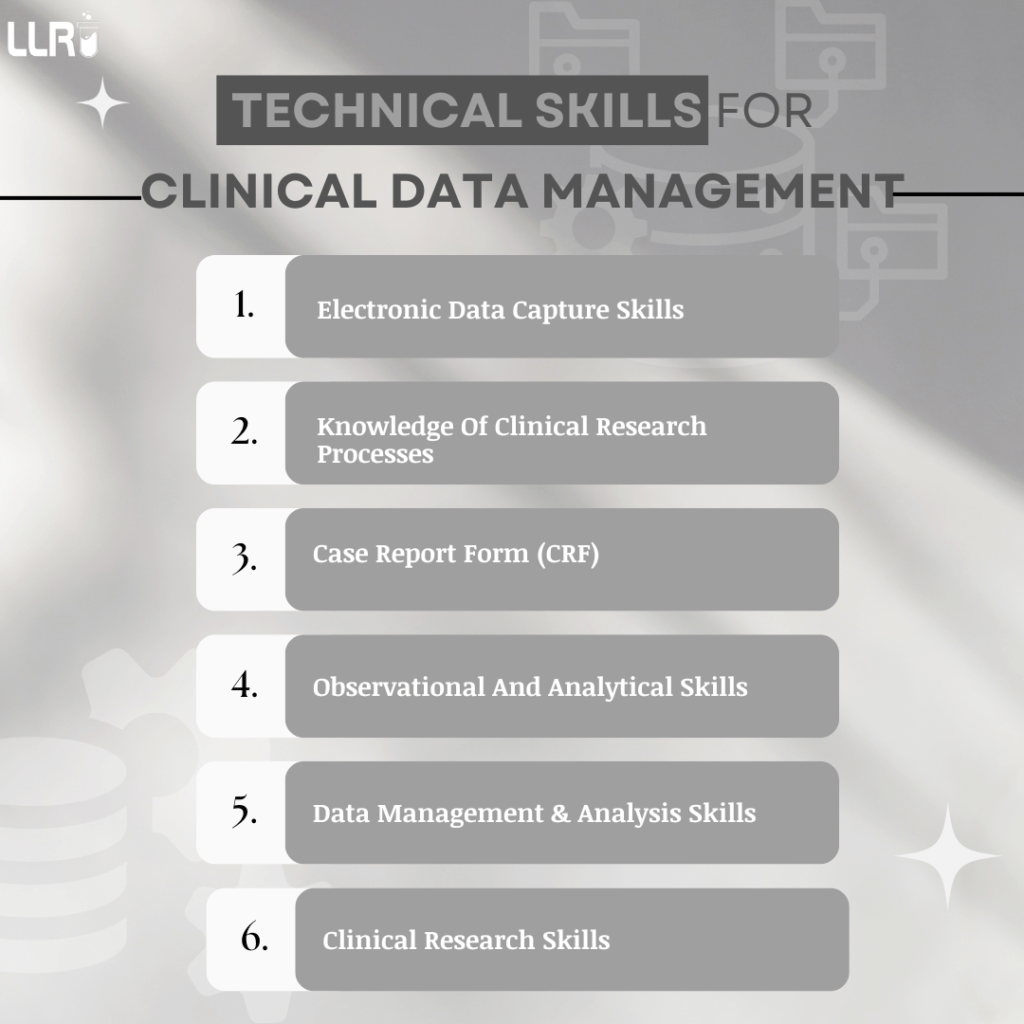What Are The Skills Required For Clinical Data Management? Skills maketh man – there have been no truer words spoken, if you were to ask us. Skills are all that make you or break you! And when it comes to the job front – skills are everything that matters!
In this blog, we will look at the skills required for clinical data management, skills that a person working in clinical data management would definitely require.
This blog contains the following:
- Skills Required For Clinical Data Management
- Skills For Clinical Data Management
- Essential Skills For Clinical Data Managers
- Technical Skills For Clinical Data Management
What Are The Skills Required For Clinical Data Management?
A primary aspect of clinical trials and research, clinical data management makes sure that the data collected is accurate, reliable, and used effectively. If you are looking for a Clinical Data Manager job or planning to begin your job as a Clinical Data Analyst, the first step would be finding a reliable Clinical Research Institute to help you get the right certifications.
When we talk about the skills for clinical data management or the necessary skills a clinical data manager should possess, we’re referring to a blend of technical know-how and personal skills that play a primary role in guiding one toward success. How can these skills help? Well, let’s find out, shall we?

5 Skills For Clinical Data Management
Some skills for clinical data managers include the following:
1. Attention to detail: Clinical data managers need to be meticulous. They must ensure that all data entries are accurate and any discrepancies are quickly addressed. A single error can have significant consequences for research outcomes, therefore making this one of the most important skills a clinical data manager should have.
2. Organizational skills: Managing large datasets requires excellent organizational skills. Clinical data managers must be able to keep track of various data points, documents, and timelines efficiently.
3. Problem-solving ability: Challenges in data collection and management are common. However, it is the duty of the Clinical Data Manager to oversee the entire process and to avoid the occurrence of mistakes, if any. Therefore, being able to identify problems and find effective solutions is a key skill for clinical data management.
4. Communication skills: Clear communication is central to everything, especially when working with different teams and stakeholders. Clinical data managers often need to explain data-related issues or findings to people who are not specialized in the field, simplifying the whole thing essentially, which can be achieved by completing any reputed clinical research course.
5. Project management: The ability to manage multiple tasks and projects simultaneously is one of the very important skills required for clinical data management. This is because, clinical data managers often oversee various aspects of data handling, from collection to reporting.
Now you may be wondering, are these essential skills for clinical data managers really necessary? Yes, they are!
Why? Well, as we said before, these can either make or break your job, and therefore one looking to land a job in the field, or those who are trying to improve their skill set would definitely benefit from possessing these skills.
So, let’s round it up once again, yeah?

What are the essential skills for clinical data managers?
Essential skills for clinical data managers include a mix of technical expertise and soft skills:
- Knowledge of clinical trial processes, including phases, protocols, and regulations.
- Ensuring the accuracy and reliability of data is a core responsibility.
- Familiarity with regulatory requirements such as GCP (Good Clinical Practice) and FDA guidelines.
- Being able to interpret complex data sets and generate meaningful insights is vital. Often, clinical data managers work in teams with researchers, statisticians, and other professionals, therefore, being able to collaborate effectively is essential.
| Skill | Description |
| Data Analysis | Ability to interpret complex data, identify trends, and make data-driven decisions. |
| Attention to Detail | Ensuring accuracy and completeness of data, minimizing errors, and adhering to protocols. |
| Regulatory Knowledge | Understanding regulations and guidelines such as GCP, FDA, and ICH to ensure compliance. |
| Technical Proficiency | Familiarity with data management systems, databases, and software like EDC systems and SAS. |
| Communication Skills | Effective communication with team members, stakeholders, and sponsors to facilitate data flow and resolve issues. |
What Are The Technical Skills For Clinical Data Management?
Now that we have explored the essential skills for clinical data managers, here is a breakdown of the technical skills comprised of to the specific technical knowledge and tools that are used in the field.
Here are the necessary required technical skills for clinical data management:
1. Database management: Proficiency in managing databases is one of the important technical skills for clinical data management jobs. This comprises using database software like Oracle, SAS, or EDC (Electronic Data Capture) systems.
2. Statistical software: Familiarity with statistical tools such as SAS, R, or SPSS helps in data analysis and interpretation. Knowledge of these tools is an important technical skill for clinical data management.
3. Data entry systems: Experience with data entry systems and software ensures that data is entered correctly and efficiently. This includes understanding data entry forms and electronic data management systems.
4. Data cleaning and validation: Skills in data cleaning, such as identifying and correcting errors or inconsistencies helps in maintaining data quality – very very imp for clinical data managers!
5. Programming skills: Basic programming skills, especially in SQL or similar languages, can help query databases and manage data is one other necessary essential skill for clinical data managers.

On A Final Note…
It can be understood that the skills for clinical data management encompass a range of attributes from general skills like attention to detail and communication to essential skills like understanding clinical trials and data integrity.
In addition, technical skills for clinical data management are vital for handling databases, statistical software, and data entry systems effectively.
So, whether you’re a prospective data manager or looking to enhance your skills, focusing on these areas will set you up for success in the field of clinical data management.
For more information, visit us here!
FAQs
What are the skills required for clinical data management?
To excel in Clinical Data Management, one needs a strong grasp of Clinical Research guidelines, exceptional communication and interpersonal skills, meticulous attention to detail, and the ability to perform under pressure.
What skills do you need to be a clinical data associate?
A Clinical Data Associate should be well versed in data review, management, and quality, with strong proficiency in SAS and electronic data capture, a solid understanding of FDA regulatory guidelines, and the ability to manage clinical trial data.
Who qualifies for clinical data management?
A Bachelor’s degree in a scientific or healthcare-related field, 3-5 years of experience in clinical data management or a similar role within the pharmaceutical or clinical research industry, and a solid understanding of clinical trial processes, data management principles, and regulatory guidelines.

